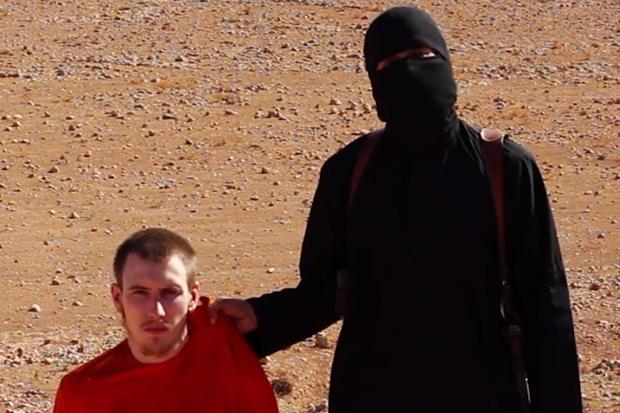ISIS reaches a decisive turning point
Michael Young/ The Daily Star/07.02.15
The burning alive of a Jordanian pilot reminds us how a few months ago many people, while acknowledging the savagery of ISIS, were also praising the cleverness of its leadership. Today that conclusion appears less persuasive.
The strength of groups such as ISIS is that when they are expanding, they generate momentum that draws in the undecided in countries that the group seeks to affect or take over. This was the message in the rapid ISIS advances in Syria and Iraq last summer. The group’s successes built on, and profited from, the alienation felt by Iraq’s Sunnis toward a state led by a man openly favoring the Shiite community.
The success of insurgent movements is often based on their ability to exploit existing social contradictions and cleavages. However, ISIS soon forgot how central this had to be to its strategy, and instead highlighted its sheer brutality. Violence can be a valuable tactic to sow fear among foes; but there is a stage at which it has a contrary effect. It unites previously divided adversaries; it provokes outrage and dread that makes resistance much more bitter; and it may define a group at the expense of the more important image it seeks to project.
All this has been visible in recent months. By conquering territory in Iraq and decapitating American hostages, ISIS precipitated a tacit alliance between the United States, Iran, Iraq’s government and the Gulf states, whose divisions and rivalries had allowed ISIS and other jihadi groups to grow in the first place. This coalition has turned the tide, spearheading the recapture of Diyala province in Iraq as well as large swathes of northern Iraq, making ISIS-controlled Mosul vulnerable.
The inhumaneness of ISIS has also made its enemies more determined to fight back, as we apparently saw when the group tried to take control of the Deir al-Zor military base last December. Whereas the group had seemed unstoppable in eastern Syria, it was unable to triumph this time around.
Much the same can be said of the ISIS offensive against Ain al-Arab, or Kobani, which proved to be the group’s great blunder. While the town’s strategic significance was limited, its symbolic importance was immense: it was a battle that the U.S., ISIS and the Kurds could not afford to lose. Ultimately, coalition aircraft were able to inflict far heavier losses on ISIS than was sustainable and the group was obliged to withdraw.
Moreover, Turkey emerged from the confrontation bruised, as its implicit collaboration with ISIS came under international scrutiny. Worse, the U.S. formed an alliance with Syrian Kurds close to the Kurdistan Workers Party opposed to Ankara.
The third error of ISIS was to allow itself to be characterized by its violence, when the ultimate aim of its leader, Abu Bakr al-Baghdadi, is to set up a caliphate that will draw Sunnis toward him. Yet aside from psychopathic terror groups, who really wants to rally to such a repulsive, pathological entity whose sustainability is in greater doubt by the day, and whose only attribute is an ability to concoct barbaric ways to kill people?
If ISIS were ever to have appeal as a state project, it would have to incorporate elements of “soft power” into its agenda. Ironically, the Nusra Front, otherwise little better than ISIS, has attempted to do so, showing itself to be more merciful, which has shielded it in certain parts of Syria.
Baghdadi’s state has been an illusion. Hubristically, it announced some months ago that it intended to print a new currency. Yet its economic backbone is collapsing; those living in its areas appear to be less and less satisfied with their predicament; and there are even senior figures within ISIS who now regret having joined the group, as Martin Chulov reported in a recent piece for the Guardian on the formation of ISIS.
To those who might have followed ISIS once, the appeal is largely gone. The group has been so vicious, while offering no recompenses, that few see benefits in joining it. As Al-Qaeda’s Ayman al-Zawahri wrote to Abu Musaab al-Zarqawi, the leader of Al-Qaeda in Iraq, in July 2005: “In the absence of … popular support, the Islamic mujahed movement would be crushed in the shadows, far from the masses who are distracted or fearful … Therefore, our planning must strive to involve the Muslim masses in the battle, and to bring the mujahed movement to the masses and not conduct the struggle far from them.”
While there will always be marginalized individuals who answer the call of ISIS, Zawahri was making a larger point that a jihadi movement must anchor itself in a population to thrive and survive. ISIS has done the contrary, terrorizing societies under its rule, and even senior members of its leadership who dare not challenge its policies for fear of retribution.
ISIS will remain with us, but it’s fair to say it has created a perfect storm of animosity and opposition, which means its ability to extend its authority has been decisively curtailed. Rather than pick its battles carefully, the group roused myriad enemies simultaneously. Opening new fronts can be useful when on the upswing, but ISIS has done so lately mainly to limit its losses. Baghdadi’s ambitions may have gotten the better of him and now the shortcomings are visible.
Michael Young is opinion editor of THE DAILY STAR. He tweets @BeirutCalling.























